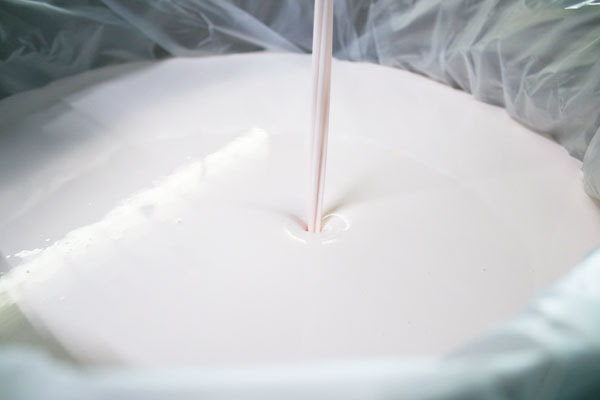The preparation of water-based pressure sensitive acrylate adhesive
The preparation of water-based pressure sensitive acrylate adhesive with high solid content has been one of the research hotspots at home and abroad.
Pressure sensitive adhesive refers to a kind of adhesive that can be bonded with the adhesive under external pressure. At present, it is widely used in sealing belts, labels, protective tape and decorative plates, and other industries. With the development of industry, the application market of adhesives for self-adhesive labels is more and more extensive, and the varieties are increasing. The commonly used adhesives are solvent-based, water-based, and hot-melt. At present, the amount of solvent-based products is relatively large, which uses toluene, benzene, and other volatile organic compounds as solvents.
These solvents will directly volatilize into the atmosphere in the process of use, which will pollute the environment and endanger workers’ health. Therefore, in recent years, domestic government departments at all levels have constantly strengthened the supervision of organic exhaust emissions and restricted the use of volatile organic compounds. And the residual solvent in the sticker label is harmful to human health. At present, water-resistant white (no white after soaking in water for a long time) self-adhesive labels are used in food and beverage packaging. Some need to be refrigerated for a long time (contact with condensate), and bottle labels need to be pasteurized (high temperature and high humidity).
These kinds of labels still use toxic and harmful oil-based pressure sensitive adhesive, and the transformation of adhesive from solvent type to water-based type and non-solvent type has become inevitable. The peeling strength of pressure-sensitive adhesive mainly depends on the adhesion force of the polymer and colloid on the bonding surface. The holding viscosity is mainly determined by cohesion, and cohesion and cohesion affect each other. At the same time, there should be a proper balance between cohesion and holding viscosity. Traditional pressure-sensitive adhesive products have poor cohesion, poor adaptability to substrates of different polarities, and poor temperature resistance, resulting in defects in the adhesion and weather resistance of products, especially water-based system products.

The application market of adhesives for peeling self-adhesive labels is becoming more and more extensive. Currently, the existing adhesives are solvent-based and hot melt. Among them, the mainstream two-component solvent-based pressure-sensitive adhesive used by peeling self-adhesive has environmental protection problems and a large number of organic volatilization. Must be in 2 used up within 3 hours after adding curing agent, use not convenient. In the market, the water-based pressure-sensitive adhesive is mainly acrylic emulsion pressure sensitive adhesive, which has the advantages of a simple preparation process, low cost, safety, and non-toxic, as a typical green product, more and more favored by the market.
Acrylic emulsion pressure sensitive adhesive due to water as the medium, the drying speed is slow, especially for some pressure sensitive adhesive products with a large amount of glue, the coating drying problem is particularly prominent, therefore, in the application of acrylic emulsion pressure sensitive adhesive, it is necessary to improve its solid content to solve the problem of slow drying and high coating energy consumption.
Traditional emulsion between 30 50% solid content and high solid content emulsion generally refers to the solid content in 54 62% of polymer emulsion, emulsion, high solid content emulsion more traditional prominent advantage is that its dry film speed, transportation, and storage cost is greatly reduced and the environmental pollution and small, This makes high solid content emulsion in reducing cost and emulsion performance has a great advantage, therefore, the high solid content emulsion has broad application and development prospects. However, when the solid content of the emulsion exceeds 50%, the viscosity of the emulsion system will rise sharply with the increase of the solid content in the emulsion polymerization.
The increase of the viscosity will lead to problems of monomer mixing, reaction heat transfer, and so on in the emulsion polymerization system so that the emulsion polymerization cannot be carried out stably and a large number of condensates will appear, which is not conducive to production. It even leads to synthesis failure or serious accidents such as burst polymerization. At present, the solid content of pressure sensitive adhesive on the market is below 50%. Therefore, the preparation of water-based pressure sensitive acrylate adhesive with high solid content has been one of the research hotspots at home and abroad.

Leave a Reply
Want to join the discussion?Feel free to contribute!